
John Gostlin (or Gostlyn; c. 1566 – 21 October 1626) was an English academic and physician, Master of Gonville and Caius College, Cambridge from 1619 and Regius Professor of Physic.

John Gostlin (or Gostlyn; c. 1566 – 21 October 1626) was an English academic and physician, Master of Gonville and Caius College, Cambridge from 1619 and Regius Professor of Physic.
He was born in Norwich in or about 1566, the son of Robert Gostlin of that city. Educated at Norwich School for six years, he was admitted at Caius College, 22 November 1582, as a scholar. He graduated B.A. 1586–7, M.A. 1590, M.D. 1602 (incorporated M.D. at Oxford, 1612). [1] He was elected to a fellowship about Easter 1591–2, which he retained until he became Master, 26 February 1619.
On the death of Thomas Legge, Master of Caius (12 July 1607), there was an election favouring Gostlin; but when there was a dispute Robert Cecil, 1st Earl of Salisbury, then Chancellor of the university, vacated the election and appointed William Branthwaite, then a Fellow of Emmanuel College. Gostlin then retired to Exeter, where he practised medicine, and was returned as Member of Parliament for Barnstaple in 1614. After Branthwaite's death in January 1619, the fellows immediately met and chose Gostlin. The king's letter was brought soon after, recommending a theologian, but the fellowship had their way.
In 1623 he was appointed Regius Professor of Physic, to which he was recommended by Isaac Barrow. He was twice vice-chancellor of the university, dying during his second tenure of the office, 21 October 1626. There is an account of his death in Joseph Mead's Letters (British Library Harley MS 390); it also was the occasion for an early poem of John Milton. His will is dated 19 October 1626, and was proved 6 December 1626. He was buried in the college chapel, where there is a monument to him. He does not appear to have published any works. He was a benefactor to Gonville and Caius, where he is specially commemorated, and St Catharine's College, Cambridge.
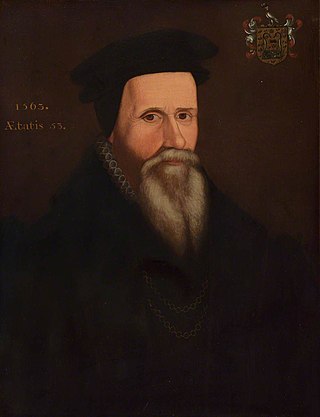
John Caius, also known as Johannes Caius and Ioannes Caius, was an English physician, and second founder of Gonville and Caius College, Cambridge.
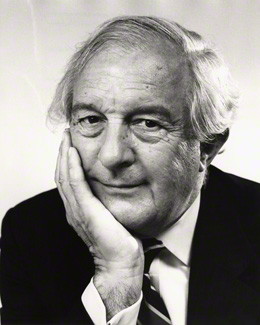
William John Hughes Butterfield, Baron Butterfield, was a leading British medical researcher, clinician and administrator.

The Ascension Parish Burial Ground, formerly known as the burial ground for the parish of St Giles and St Peter's, is a cemetery off Huntingdon Road in Cambridge, England. Many notable University of Cambridge academics are buried there, including three Nobel Prize winners.

William Branthwaite (1563–1619) was an English scholar and translator.
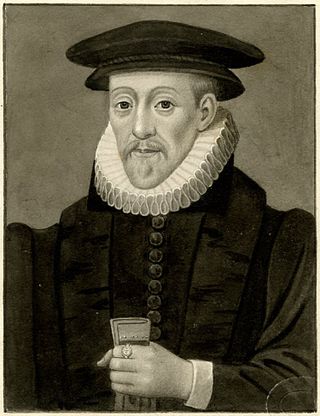
Thomas Legge was an English playwright, prominently known for his play Richardus Tertius, which is considered to be the first history play written in England.

Gonville and Caius College, often referred to simply as Caius, is a constituent college of the University of Cambridge in Cambridge, England. Founded in 1348 by Edmund Gonville, it is the fourth-oldest of the University of Cambridge's 31 colleges and one of the wealthiest. In 1557, it was refounded by alumnus John Caius. The college has been attended by many students who have gone on to significant accomplishment, including fifteen Nobel Prize winners, the second-highest of any Oxbridge college after Trinity College, Cambridge.
John Warner was an English academic, cleric, and physician. He was the first Regius Professor of Physic at the University of Oxford, as well as the Vice-Chancellor of the University of Oxford and the Dean of Winchester.
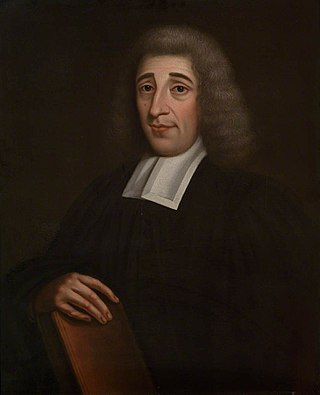
Sir James Burrough was an English academic, antiquary, and amateur architect. He was Master of Gonville and Caius College, Cambridge, and designed or refaced several of the buildings at Cambridge University in a Classical style.
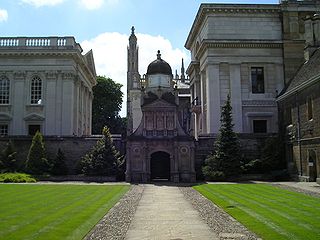
Christopher Green (1652–1741) was a Cambridge academic, Regius Professor of Physic from 1700 to 1741.

William Smyth was an English poet and historian, who became Regius Professor at Cambridge in 1807.
William Rougham was the second master of Gonville Hall, Cambridge from c. 1360. He had been a fellow of the college since the 1350s and was Bachelor of Medicine by 1366. He was also a priest with livings in the Diocese of Norwich and was personal physician to Henry le Despenser, Bishop of Norwich.

Andrew John Schofield is an academic and administrator who is the Vice-Chancellor of Lancaster University. A theoretical physicist, he was previously a Pro-Vice-Chancellor at the University of Birmingham and Head of its College of Engineering and Physical Sciences. As an academic, his research focus is in the theory of correlated quantum systems, in particular non-Fermi liquids, quantum criticality and high-temperature superconductivity.
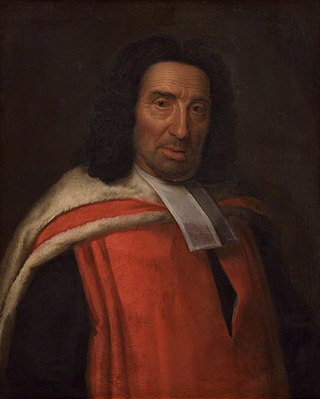
Sir John Ellys or Ellis (1634?–1716) was an English academic, Master of Gonville and Caius College, Cambridge from 1703.
Graham John Zellick is a former Vice-Chancellor of the University of London, serving from 1997–2003 and previously Principal of Queen Mary and Westfield College, London, from 1991–98.

Sir George Edward Paget, was an English physician and academic.
Peter Gonville Stein, QC, FBA was a British legal scholar.
Professor John Dixon Mollon DSc FRS. is a British scientist. He is a leading researcher in visual neuroscience. His work has been cited over 15,000 times.

James Halman was an academic of the University of Cambridge. He held the office of Registrary of the university from 1683 to 1701 and was also the twenty-third Master of Gonville and Caius College.
John Forbes Cameron was a Scottish mathematician, academic and academic administrator. He was Master of Gonville and Caius College, Cambridge from 1928 to 1948 and was Vice-Chancellor of the University of Cambridge from 1933 to 1935.

Richard Fisher BelwardD.D. FRS was an academic in England in the second half of the 18th century and the early years of the 19th. He was born Richard Fisher, adopting the name Belward in 1791.